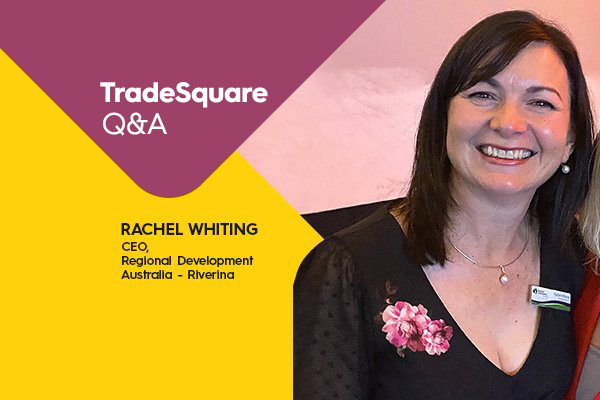Riverina-based Rachel Whiting describes herself as a professional, mentor, leader, learner, wife and mother, manager, community member, volunteer and advocate, collaborator – and a horse breeder and equestrian as well.
Before becoming CEO of Regional Development Australia, she worked in the Pilbara region of far northwest WA in a role helping businesses to grow, which afforded her the opportunity to work on collaborative projects and think big. “I really loved that part of the job and when I moved to the Riverina and this position came up, I thought I had to have it.”
TS: Thinking about the last 12 months, how have you seen businesses in the Riverina area evolve and add more value to the world?
RW: We've been significantly resilient. The first Covid lockdown obviously affected everyone, and even the restrictions from crossing the Victoria-New South Wales border have affected the Riverina.
We are mainly an agriculture-based economy, and business owners and people living in our region are constantly coming up with great ideas about how to make the best of what's here and how to add value to what we already produce. We are seeing more and more exciting ideas come out of the Riverina, especially in regards to agriculture-related manufacturing.
TS: Are there any particularly innovative and really creative ideas that you would be open to sharing?
RW: Everybody should take a look at the Whitton Malt House. They've started this amazing hospitality venue, which also has that value-adding manufacturing behind it growing the grains and then creating the malt that goes into whiskey-making all over the country. It's incredible. I love that this business is so integrated in so many parts of our economy. It's also really committed to giving our young people a career.
And Southern Cotton, which we have been very involved in over a number of years with our own program. They offer amazing gap year programs for year 12 graduates that aren't really sure what they want to do next.
TS: With regionalisation being a key focus across Australia, how will this impact the Riverina?
RW: It will be positive in that we need people for our workforce to be able to capitalise on those ideas that I've spoken about and to expand those businesses – especially manufacturing or agriculture-related businesses, that are so well placed for expansion in our region. Their biggest problem is not being able to get enough skilled people. We need people so much here at the moment. The negative side is that we have to be careful we are not getting left behind when it comes to the infrastructure that's needed to enable that growth.
TS: Is that infrastructure for growth, both physical and digital infrastructure?
RW: The digital infrastructure issue comes up all the time. We've seen the benefits of the mobile black spot program, yet there are still black spots all over the country. But I think what's really important to know is that as far as I'm aware, all of our towns and villages have pretty good internet infrastructure. This myth that regional Australia doesn't have good communications technology needs to be busted.
TS: What's the key message that you are super passionate about, that you are advocating and championing through your work at RDA right now?
RW: We run a great program called country change along with all the councils in our region. That's all about promoting the livability of the Riverina. We have a sister website called Jobs Riverina, showcasing job opportunities for people. That’s the main thing that we're pushing: workforce development, which is about how we get more people here, and showcasing just how great and how diverse our region is. Whatever type of housing you want, whatever type of community you want to live in, I'm pretty sure the Riverina can deliver on it. We want people to come out and have a look. People are always surprised, like ‘Wow, we didn't know there were real shopping malls’.
People from outside don’t know we have such great tourism locations, which are fabulous for locals to visit at weekends – like the Junee Licorice Factory, Coolamon Cheese, or the Temora Aviation Museum, or the amazing vineyards we have across the region. We encourage people to come and visit – that's great for tourism – but also for them to consider this is somewhere they could live.You'd be surprised by the livability of the Riverina.
TS: You touched on the Workforce Development earlier. I would love to understand more around what is needed to upskill and to rescale the workforce for now and for the future for your agricultural businesses. Obviously, there are a lot of businesses that are technologically enabled, more so now than ever. What are those soft and hard skills that people really need to enable that to develop?
RW: We’re really keen to encourage people – especially our youth – to upskill for industry in the region. But we need more people – we can't do this all internally. We need people here from every trade you can imagine. We have plumbing companies that cannot get enough plumbers, and there are not enough builders for developments. For the future, we need metal manufacturers, welders, electricians, boilermakers and diesel mechanics. Then we need engineers of all sorts, health workers like nurses and doctors as well. And we need chefs and cooks.
We've talked about the amazing hospitality industry and tourism in the region, but during Covid, some of those businesses have struggled to get the skilled workers they need. So if you are sitting in Sydney or somewhere else and are out of work, then check out the Riverina!
Interested in learning more? Listen to our entire conversation with Rob Hillard at the TradeSquare podcast, TSQ here.


Leave Comment